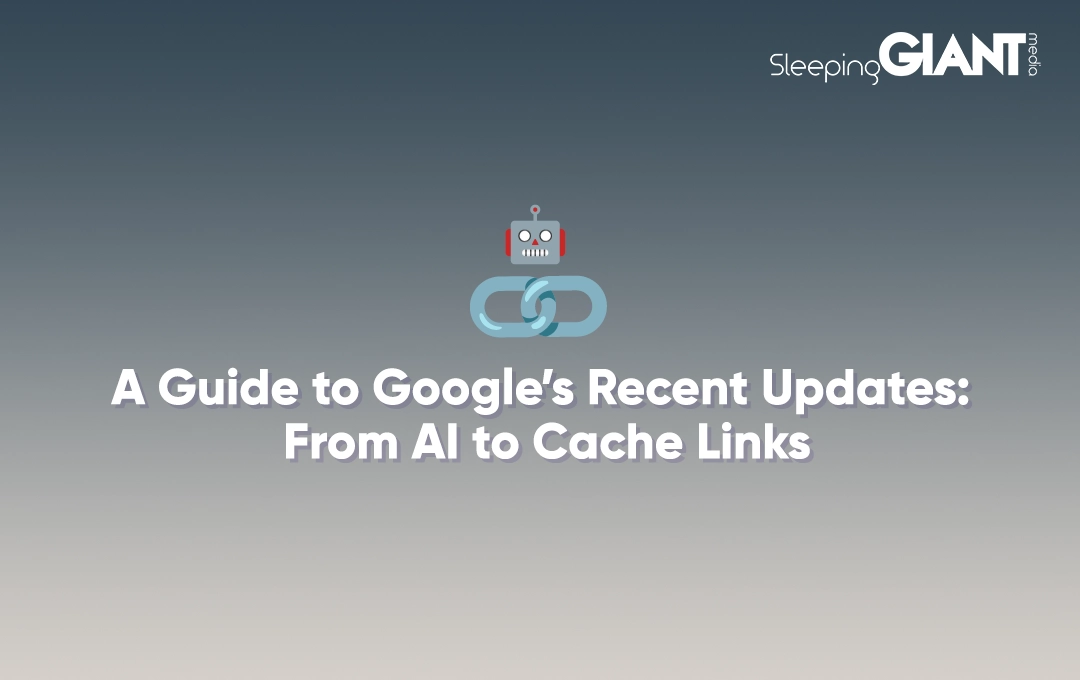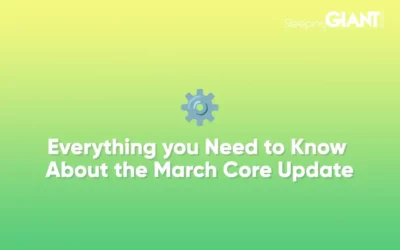
A Guide to Google’s Recent Updates: From AI to Cache Links
The start of 2024 was relatively quiet with no core algorithm updates jumping out of the woodwork, but that doesn’t mean Google hasn’t been busy. On the contrary, Google has been making small changes here and there to enhance its tools and products across the board. Or, in one case, completely remove the tool (farewell, cache links).
Not up-to-speed with the latest changes? Keep reading to learn all about the updates to the Core Web Vitals tool, the cache link retiring, and Google’s rebranding of the Bard.
The Core Web Vitals tool update
It’s been known for some time now that Google is going to replace one of its Core Web Vitals metrics with a new one and, finally, we’ve been given the launch date.
If you’re not sure what the new Core Web Vital metric is or why it’s being implemented, keep reading.
What are Core Web Vitals?
According to Google, Core Web Vitals is a set of metrics that measure the user experience of a webpage, including loading performance, interactivity, and visual stability. The Core Web Vitals metrics currently are:
- Largest Contentful Paint (LCP) which measures loading performance
- First Input Delay (FID) which measures interactivity
- Cumulative Layout Shift (CLS) which measures visual stability
However, from the 12th of March 2024, Interaction to Next Paint (INP) will replace FID as part of an update to the Core Web Vitals.

Why is Interaction to Next Paint replacing First Input Delay?
Google has been experimenting with INP since May 2022 as a replacement for FID. According to the team, it became clear that FID didn’t have the full capabilities necessary to capture aspects of interactivity on the web. The new metric should be much more reliable and a better measure for optimising your website.
INP has now been promoted to a stable status and is ready to become a Core Web Vital metric in March. This means that FID will be removed permanently from the metric system. You won’t need to change the way you optimise your website going forward – the metric will just be more accurate when assessing your webpage on responsiveness.
Cache link is retired
This might be an update that you’re not too happy about… Don’t worry – we get it!
If you’re not familiar with the cache link feature, it allows users to view a cached version of a webpage directly from Google Search. However, the feature was retired as of February 2024.
What was the purpose of the cache link?
Historically, the cache link was brought in by Google to help preload content that might have been slightly slower to load, during a time when the web, in general, was slower to load.
Fast forward a decade (or more), and web page loading speeds are much quicker than before. Users don’t generally have the same problems with a page not loading, therefore, Google has essentially said it’s no longer a requirement to have.
From an SEO perspective, this may be slightly frustrating as the cache link works well for debugging web pages. That being said, there are a couple of good replacements to be aware of, including Google Search Console and Wayback Machine.
What does the change mean for web developers and website owners?
The change won’t impact web developers and website owners day-to-day, but it certainly reinforces the importance of having a fast-loading website.
The main impact will fall on users as they will no longer be able to access cached versions of web pages, and will need to find alternative options for accessing archived content.
Google’s Bard rebrands to ‘Gemini’
We were never much of a fan of the name “Bard” anyway… But, on a more serious note, this rebranding reinforces the point that Google is continuing to invest in AI technologies and their own AI ecosystem, Gemini.
Google has even gone as far as launching a Gemini mobile app to provide easy access to AI on Android and iOS phones.
Why has Google rebranded Bard?
According to Google, the rebranding of Bard to Gemini reflects the more advanced capabilities of the AI tool. Gemini uses a new Ultra 1.0 model called ‘Gemini Advanced’ which uses Google’s most advanced AI model to handle complex tasks.
Is it a rival to ChatGPT? It would appear so. Gemini Advanced is a paid version which rivals the paid version of ChatGPT, so it’s clear that Google is stepping up its game to be a major player in the AI universe.
How could this impact the SEO landscape?
Will we see search engines disappear and become chatbots? Possibly, but there’s a long way to go before that potentially happens. What we can be fairly certain about is that search engines will develop and transform over the next few months and years, integrating more AI features as they become available.
The key things for SEO professionals to focus on are entities and question-based content. We know that chatbot features are naturally more question-and-answer based but, even before looking at AI features, entity SEO is seeing great results so this should be a primary focus for marketers and business owners.
Need support with your SEO strategy?
That’s it for Google’s recent updates. Nothing too huge or impactful, but hopefully our synopsis gives you a good awareness of what’s happening in the world of Google right now. No doubt, we’ll have a core algorithm update to deep dive into in our next blog.
Need support with your SEO strategy? Our experienced team of SEO professionals are always on hand to guide you through entity SEO, site optimisation and SEO best practices.
Get in touch with our Giants today and, in the meantime, keep up to date with our blog to hear more about the latest SEO updates.
Blog
Everything you Need to Know About the March Core Update
We knew it wouldn’t be long before Google released their first core update of...
Giant Wednesday
How To Optimise Images For Websites
Digital Marketing, technology & business insights, how-to's and explainer...




